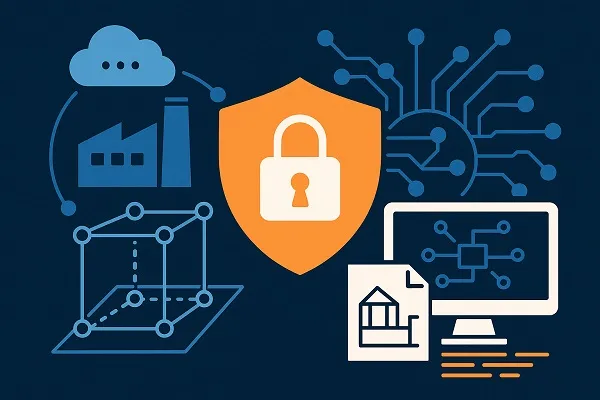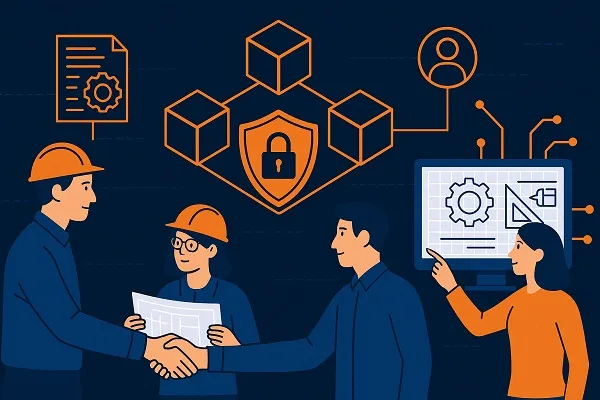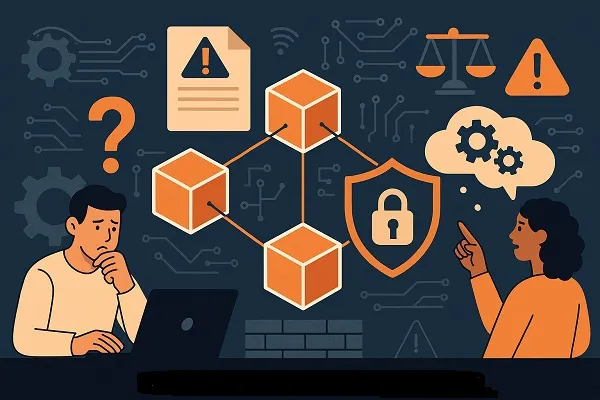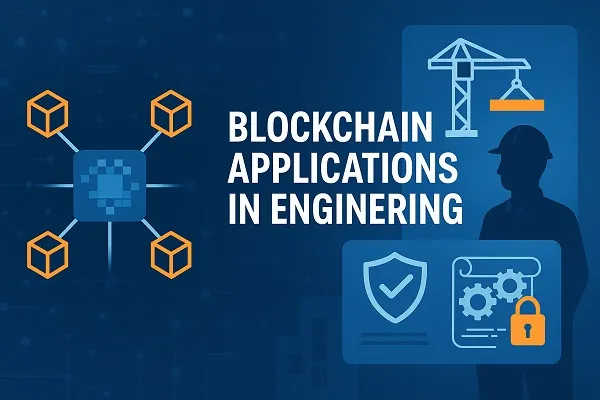Blockchain technology is transforming engineering by offering secure, transparent, and decentralized solutions across various disciplines. From supply chain integrity and digital twins to smart contracts and secure data management, blockchain is being applied in ways that optimize efficiency, safety, and accountability in engineering projects.
By leveraging blockchain’s core features—immutability, transparency, and decentralization—engineers are solving traditional challenges related to data integrity, traceability, and collaboration in complex environments.
1. Enhancing Supply Chain Transparency
One of the most impactful blockchain applications in engineering is improving supply chain transparency.
Key Benefits:
- Immutable Tracking: Blockchain enables real-time tracking of components and materials throughout the supply chain, ensuring authenticity and reducing fraud.
- Verification of Certification: Engineering components, such as safety valves or structural steel, often require compliance certifications. Blockchain allows these certificates to be linked directly to the product, preventing counterfeits.
- Reduced Delays: Transparent logistics supported by blockchain minimize disputes and administrative delays caused by missing or falsified paperwork.
By recording every step of a component’s lifecycle on a blockchain, engineers can verify its origin, quality, and handling history before it’s ever used in a project.
2. Smart Contracts for Project Management
Smart contracts—self-executing contracts coded onto a blockchain—have revolutionized project management in engineering.
Applications in Engineering Projects:
- Automated Payments: Contractors and vendors are paid automatically once specific milestones or inspection criteria are met.
- Compliance Enforcement: Smart contracts can ensure that safety checks, environmental regulations, or structural standards are met before progressing to the next stage.
- Improved Collaboration: Different stakeholders—engineers, architects, contractors—can interact transparently through smart contracts without relying on centralized oversight.
This automated and secure mechanism reduces human error and enhances accountability across complex engineering projects.
3. Securing Digital Twin Data

Digital twins—virtual replicas of physical assets—are increasingly used in engineering to simulate and monitor performance. Blockchain provides a secure and auditable system for managing the vast data generated by digital twins.
Why Blockchain Matters Here:
- Data Integrity: Sensor data from real-world assets is stored immutably, ensuring the digital twin reflects accurate and verified information.
- Version Control: Engineering teams can trace all modifications made to the twin, providing a reliable audit trail.
- Interoperability: Blockchain enables secure data exchange between different software platforms managing digital twins.
When combined with IoT and AI, blockchain ensures that digital twins are trustworthy and resilient against tampering or data corruption.
4. Quality Assurance and Compliance Tracking
Ensuring that engineering standards are met consistently across multiple locations and vendors is a major challenge. Blockchain helps maintain quality assurance by offering:
- Real-time Audits: Immutable logs of manufacturing, inspections, and maintenance records.
- Certification Chains: Link each component to its testing data and quality certifications.
- Regulatory Compliance: Blockchain records simplify demonstrating compliance to regulators and clients.
This is particularly useful in industries like aerospace, civil infrastructure, and energy, where strict compliance standards must be met and documented.
5. Intellectual Property Protection
Engineering designs and innovations are valuable intellectual property (IP) assets. Blockchain can serve as a tool for protecting these assets without needing intermediaries.
Key Features for IP Management:
- Proof of Ownership: Design files and blueprints can be time-stamped and registered on the blockchain to prove authorship.
- Usage Rights Tracking: Licensing terms can be enforced via smart contracts, limiting unauthorized use or distribution.
- Collaboration Security: When engineers collaborate across borders, blockchain ensures contributions are recorded and credited appropriately.
This allows engineering firms to innovate confidently while protecting their proprietary work from theft or misuse.
6. Decentralized Engineering Collaboration

In large-scale engineering projects involving multiple companies or stakeholders, managing data and communications can be complex. Blockchain facilitates decentralized collaboration without sacrificing security.
Benefits for Teams:
- Unified Recordkeeping: A single source of truth for design changes, material approvals, and construction milestones.
- Access Control: Different team members get customized access based on their roles.
- Cross-Platform Communication: Data can be synchronized securely across platforms, even if different software tools are used.
This decentralized yet synchronized approach boosts trust and coordination in large engineering ecosystems.
7. Blockchain in Civil and Structural Engineering
Civil and structural engineers are using blockchain to enhance project efficiency and safety.
Use Cases:
- Material Verification: Concrete, steel, and other materials are tracked from production to installation, ensuring only certified items are used.
- Inspection Logs: Site inspections and safety audits are logged on-chain, reducing the risk of oversight or manipulation.
- Infrastructure Maintenance: For bridges and highways, blockchain stores a history of inspections and repairs, which can be accessed by future engineers or authorities.
This level of transparency and accountability is especially valuable in public infrastructure projects, where safety and auditability are paramount.
8. Automation in Engineering Supply Networks
Blockchain enables automation in engineering supply chains by combining IoT devices and smart contracts.
- IoT Sensors: Embedded in shipments to track location, temperature, or handling conditions.
- Smart Alerts: If a shipment is delayed or mishandled, blockchain can trigger alerts or penalties through predefined contract terms.
- Predictive Reordering: Smart contracts can automatically reorder supplies when inventory levels fall below a threshold.
This creates a more efficient and resilient supply network, especially critical in just-in-time manufacturing and construction operations.
9. Sustainability and Carbon Tracking
Sustainability is a growing priority in engineering. Blockchain helps engineers quantify and report carbon emissions throughout a project’s lifecycle.
- Carbon Footprint Logs: Each material and process is logged with its associated carbon emissions.
- Green Certifications: Certifications for sustainable practices can be linked to materials and suppliers on-chain.
- Energy Efficiency Monitoring: Blockchain can track energy consumption of assets and equipment in real-time, supporting energy optimization strategies.
By using blockchain, engineers can present verifiable data to support green building certifications and sustainability goals.
Challenges and Considerations

Despite its potential, implementing blockchain in engineering requires careful consideration.
Key Challenges:
- Integration with Legacy Systems: Many engineering firms still rely on outdated software that may not be blockchain-compatible.
- Data Privacy: Sensitive project data must be protected, requiring hybrid or permissioned blockchain solutions.
- Initial Costs: Setting up a blockchain-based system involves upfront investment in development and training.
- Scalability Issues: Some blockchains struggle with high transaction volumes, which can be a concern for large-scale engineering applications.
However, with ongoing advancements in blockchain platforms, these challenges are becoming more manageable over time.
Blockchain applications in engineering are reshaping how projects are designed, built, and maintained. From ensuring supply chain integrity and automating project workflows to protecting intellectual property and enhancing sustainability, blockchain brings a layer of security and efficiency previously unattainable with traditional systems.
As engineering projects become more complex and global, adopting blockchain can offer a competitive edge by improving transparency, accountability, and operational resilience across the board.
Content reviewed and published by Tier2Tek Staffing Editorial Team .

